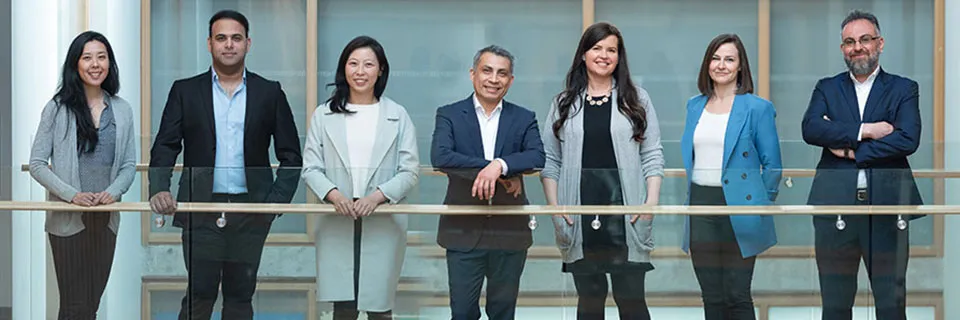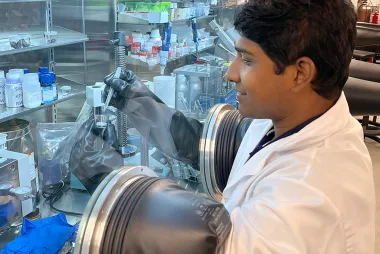The Composites Research Network (CRN), based at UBC, has more than a decade of experience of transforming great ideas into viable manufacturing processes for companies ranging from the world’s largest multinationals to small businesses.

Manufacturers face intense pressure to find better and more efficient ways to create products – whether that’s a new fuselage for a jumbo jet or a small component for a medical device.
From knowledge to practice

Composite materials are transforming industries – from aerospace and automotive to clean tech and electronics – because they allow for lighter, stronger, cleaner and safer products. Yet they are complex to design and manufacture, requiring specialized skills and expertise.
That’s a challenge, particularly for small and medium-sized businesses that might not have the know-how to advance their idea into an economically viable manufacturing process.
“We’ve worked with over 250 companies since our founding in 2012,” says Dr. Anoush Poursartip, Director of the CRN, which was launched with funding from the federal government and The Boeing Company. “Companies come to us for advice on how to transform their ideas into viable products. We fill in the research gap to remove the impediments that prevent commercialization.”
Finding right-sized solutions

Poursartip is passionate about helping small and medium-sized enterprises advance their manufacturing capacity to be more competitive and achieve business goals.
“We genuinely care about aligning our capabilities to help smaller companies that just don’t have the resources of big multinationals,” he says. “There are so many local companies with great ideas that just need some research gaps filled. We want to help these companies succeed by working with them to find the right-sized solution for their problem.”
Poursartip explains that the CRN can use its core funding to provide initial straightforward engineering support to an organization, and can then enter into longer-term partnerships for more complex composite manufacturing challenges.
“Any IP you have is yours. We’re not giving you advice that’s patentable – we’re enabling your patent to be manufactured.”
Doubling production rates for bike component manufacturer

CRN has helped companies across all industry sectors become more competitive. To take just one example Race Face, a BC-based business that manufactures the lightest high-performance carbon composite cycling components in North America, approached CRN for advice on how to optimize their process and reduce costs. CRN assembled a team to identify production bottlenecks and revise workflow practices.
The result? Production rates were doubled with minimal capital investment, enabling the company to expand its facilities and hire additional staff.
“Working with CRN helped us to better understand our manufacturing process, and dramatically increase our production capacity,” says Rob Moore, Race Face’s Director of Engineering.
“Prior to contacting CRN, we were heavily limited by our press capacity and high tooling costs. With our optimized process we have the potential to double our capacity, at virtually no cost, and with no loss of performance to the product. The Race Face Manufacturing/Engineering Team was challenged to better understand our curing cycle, and CRN provided us the resources, advanced laboratory equipment and knowledge to accomplish what we set out as a brand to solve.”
Knowledge resources and seminars

In addition to working one-on-one with partners, CRN offers other complementary services. The Composites Knowledge Network (CKN), launched in 2019, is a one-stop resource for composite manufacturing knowledge. CKN includes the Knowledge in Practice Centre, an open source overview of best practices in composite manufacturing and applications. It also offers events throughout the year, including seminars and training workshops facilitated by leading experts in composites.
These resources empower small businesses to gain the knowledge they need to solve manufacturing challenges.
As Duncan Pawson, a product development engineer at high-performance ski manufacturer Genuine Guide Gear, said: “We often need to change or find alternative materials used in our products. CKN proved to be an effective resource for providing the know-why and know-how knowledge dissemination between the material science and manufacturing practice.”
Composites Knowledge Network Knowledge in Practice Centre
Removing the bottlenecks to growth
Composites are the future of manufacturing, offering manufacturers control over the mechanical, physical and chemical properties of their materials to achieve specific goals, whether that’s better performance, lighter weight or a more environmentally friendly product. With CRN as a partner, SMEs can access the expertise they need to address the challenges of composite manufacturing so they can focus on other areas of the business.





